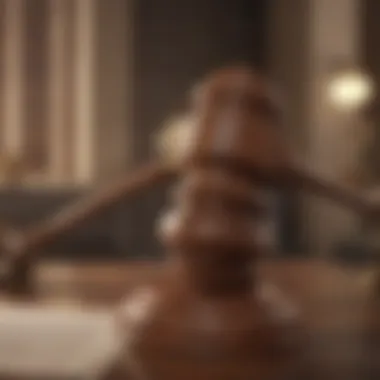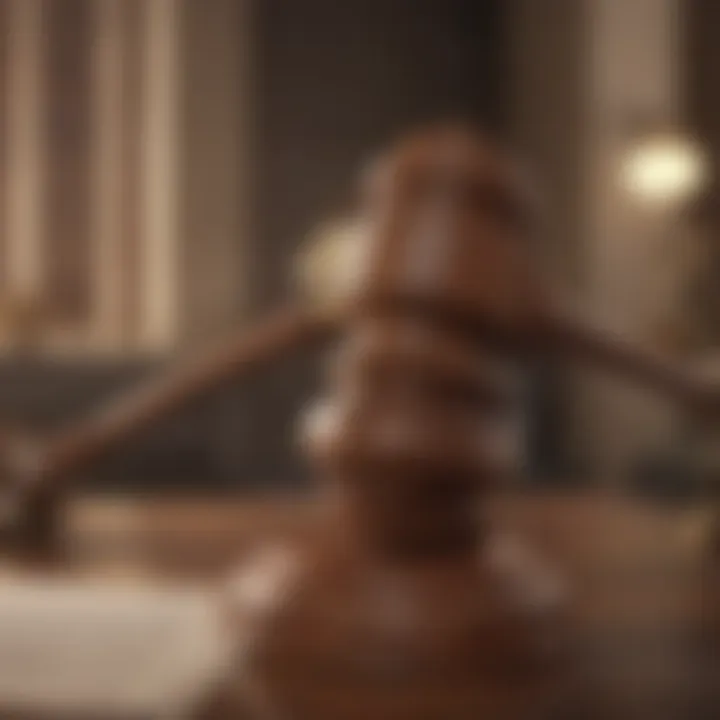Understanding the Necessity of Will Probate


Intro
When the curtain falls unexpectedly on life's stage, the matters of estates and inheritances come to the forefront. It's during these challenging times that families might find themselves grappling with the concept of probate. Understanding whether or not a will must go through probate isn't just about legalities; it's about peace of mind and financial clarity in the wake of loss. This article explores the myriad nuances surrounding the probate process, including its necessity, implications, and alternatives.
Many people assume that having a will automatically means that the probate process should follow. However, the reality is more intricate. Not all wills necessitate probate, and various factors could sway this decision—ranging from estate size to state laws. This necessitates a careful examination of the ins and outs of probate to ensure that survivors manage the estate effectively and without unnecessary hurdles.
Consider the importance of this topic in today's world. More individuals are becoming aware of estate planning, yet there remains a cloud of confusion when it comes to executing a will after a loved one's passing. The objective is clear: to distill the complexities of probate so readers emerge with a solid grasp of what is required for their unique situation.
Key Financial Terms
To navigate the conversation about probates and wills, it's crucial to familiarize ourselves with a few key terms that surface throughout the discussion.
Definitions
- Probate: The legal process through which a deceased person's assets are distributed, assessed for debts, and managed according to their will or the law if no will exists.
- Executor: The individual appointed in a will to administer the estate, ensuring that the deceased's wishes are followed.
- Testate: A term that describes a person who has left a valid will at the time of their death.
- Intestate: Refers to a situation where a person dies without leaving a valid will, leading to legal procedures defined by state laws for estate distribution.
- Estate: All the assets, debts, and property owned by a person at the time of their death.
Examples of Use
Understanding these terms can help delineate the conversation effectively. For instance, when someone passes away as testate, their executor will likely face the duty to initiate probate. If the deceased was intestate, state laws will dictate how the estate is allocated, often creating a longer and more convoluted process.
"Probate isn’t just about getting things settled; it’s a legal knitting together of finances and wishes in a time of emotional upheaval."
Even seasoned investors often find themselves puzzled about how probate impacts inheriting assets or liquidating estates. The financial implications can be significant—ranging from taxes to the potential for disputes among heirs—making it essential for everyone involved to comprehend these terms profoundly.
Expert Tips
Navigating the maze of probate can be daunting. As such, here are some strategies tailored for both beginners and those who may want to refine their understanding of estate management.
Beginner Strategies
- Educate Yourself: Familiarize yourself with the laws in your state as they strongly influence the probate process.
- Keep Records: Maintain organized records of life insurance, bank accounts, and other assets to ease the estate settlement.
- Punish Procrastination: Address estate planning as early as possible; procrastination can lead to complications when the time comes.
Advanced Techniques
- Consider Trusts: Establishing a trust can bypass probate altogether, leading to a swifter transfer of assets.
- Consult Professionals: Engaging with an attorney who specializes in estate law can save headaches down the line and provide personalized guidance.
- Communicate with Heirs: Discussing your wishes with potential heirs can mitigate conflicts and prevent misunderstanding when probate is initiated.
In the end, the decision of whether to probate a will is influenced by multiple variables, including the will's validity, the size of the estate, and the laws of the state in which the deceased resided. Understanding these dynamics is crucial for anyone involved in estate planning or management, ensuring that complexities are met with clarity and confidence.
Understanding Wills and Probate
The relationship between wills and probate forms the backbone of estate management. Grasping how these two elements interact is crucial for anyone dealing with the intricacies of planning for the distribution of assets postmortem. Wills serve as the guiding document for how one wishes their belongings to be handled after death, but the pathway to enforcing those wishes can often lead through the probate process. This section aims to untangle these concepts, shedding light on their significance and the benefits that come from understanding them clearly.
Defining Wills
A will is fundamentally a legal document that encapsulates an individual's desires regarding the distribution of their property upon their passing. In simpler terms, think of it as a final letter of instruction left behind for loved ones to follow. Wills can vary significantly in complexity and formality. Some might only reflect straightforward bequests, such as “I leave my grandma’s china to my niece,” while others can delve into intricate arrangements involving various assets, trusts, and conditional bequests.
The importance of a will cannot be overstated. Without it, the state may determine how one's estate is handled, often leading to outcomes that don’t align with the decedent’s true wishes. Therefore, having a well-drafted will is vital for ensuring that one's estate is managed according to their preferences and that beneficiaries are protected. Moreover, a well-prepared will can also assist in minimizing conflicts among surviving family members, helping to keep the peace during an already emotionally charged time.
Exploring the Probate Process
Probate is the legal process that follows the death of an individual, aiming to determine the validity of a will and overseeing the distribution of the deceased's estate. Knowing the ins and outs of this process is essential for anyone looking to navigate the murky waters of estate administration. The probate process generally includes several crucial steps:
- Filing the Will: The will is filed with the appropriate court, which then officially recognizes it as the valid last testament of the deceased.
- Identifying Assets: An inventory of the deceased��’s assets must be compiled. This can involve anything from bank accounts to real estate and personal possessions.
- Paying Debts and Taxes: Before assets can be distributed to beneficiaries, outstanding debts and taxes must be settled. This often requires time and careful bookkeeping.
- Distributing the Estate: Finally, once debts are cleared, the remaining assets can be allocated according to the will.
While the process may sound straightforward, it can often become convoluted. Various factors, such as whether disagreements arise among heirs or the complexity of the estate’s assets, can significantly impact the duration and cost of probate.
Legal Framework Surrounding Probate
Understanding the legal framework is necessary for anyone hoping to navigate the probate landscape. The laws governing probate can vary widely from one state to another. Generally, these regulations dictate how wills are validated, the timeline for probating a will, and specific forms or documents that need to be submitted to the court.
For example, some jurisdictions might allow for a simplified probate process for small estates, while others might require a more rigorous approach for estates of any size. Thus, the geographic location can play a pivotal role in shaping the experience of an estate’s administration.
Furthermore, different types of wills—like holographic wills, which are handwritten and may not need to follow formal signing and witnessing rules—can have their own sets of regulations that affect how they are treated in probate. Thus, understanding both state-specific laws and the nature of the will itself is paramount for effective estate planning.
"The probate process can often reveal cracks in family relationships just when they're most needed to hold solid. A good understanding of legal avenues can help mend those rifts before they widen."


In sum, grasping the key concepts surrounding wills and probate is essential. These tools will not just impact the distribution of assets but could very well determine the course of family relationships and the legacies left behind.
The Necessity of Probate
The importance of probate can’t be overlooked when discussing the management of estates. After someone passes away, there are a multitude of considerations regarding their assets and debts. Probate serves a crucial role in ensuring that a deceased person's will is validated and their estate is settled in an orderly manner. This process can offer several benefits, such as creating a legally recognized structure for the distribution of assets, safeguarding against fraudulent claims, and providing a clear pathway for dispute resolution.
Reasons Why a Will May Require Probate
Not every will necessarily needs to go through probate, but there are notable reasons why a lot do. For one, a will often requires probate if the deceased owned property solely in their name. This includes real estate, bank accounts, and vehicles. Without probate, these assets can’t be legally assigned to beneficiaries.
Additionally, if there are claims against the estate—such as outstanding debts—probate is critical. It helps to properly address these obligations, ensuring creditors are paid before any inheritance is distributed. In many instances, a decree from the probate court will protect the estate and its assets from random claims while the process is underway.
Determining the Value of the Estate
Understanding the estate's value is vital in the probate process. It's not just about the total worth; it breaks down into various categories: real estate, cash, stocks, and even sentimental items. All must be evaluated to make sure accurate distribution occurs among heirs.
Often, estate valuation can directly affect tax obligations as well. For instance, estates exceeding certain thresholds might trigger estate taxes. This makes it even more critical to have the process properly managed to avoid potential losses that can come from errors in valuation. In some states, reaching out to an appraiser can also provide clarity and ensure no details slip through the cracks.
State Laws and Their Variations
What’s integral to remember is that probate laws are not universal—they vary significantly from one state to another. Some states have streamlined processes to minimize the time in probate, while others may have more stringent requirements.
Consequently, knowing the local laws is essential. For example, in some jurisdictions, you might find options for small estate procedures that allow for simplified distribution without full probate, while others may require a lengthy court process irrespective of the estate size. It’s important to research the specific processes applicable where the deceased lived, as the legal nuances can significantly impact the ease and speed of settling the estate.
"Navigating the nuances of probate can mean the difference between an estate being settled efficiently or creating waves of complications."
Types of Wills and Their Probate Implications
Understanding the types of wills is crucial in the grand scheme of probate. Different wills serve various purposes, and their legal implications can significantly influence whether probate is necessary. Knowing these distinctions not only helps in estate planning but also prepares individuals for the eventualities that could arise during the probate process. The particular type a deceased person used can affect everything—from ease of execution to the duration and costs associated with settling an estate. As a piece of advice, it's wise to grasp how each of these will types interacts with the probate system in your jurisdiction.
Testamentary Wills
Testamentary wills are the most common type and often the first that comes to mind when people speak of wills. These are legal documents that take effect only upon the death of the testator—that's the person who creates the will. Testamentary wills need to be probated, as they are formal documents recognized by law, stating how the deceased's assets should be distributed.
The necessity of probate allows for a structured process, ensuring that debts are cleared and assets fairly allocated. An executor, named in the will, is responsible for managing the probate process. The probate court will validate the will, making it legally binding. However, the simplicity of a testamentary will can often face complications. For instance, if the will is contested by family members who feel excluded or if there are substantial debts owed by the estate, the probate process could stretch out for months, or even years.
Living Wills
Living wills serve a rather different purpose than testamentary wills. While they are indeed a type of will, they primarily focus on healthcare decisions rather than asset distribution. A living will lays out the individual's wishes about medical treatment and intervention should they become incapacitated. This is not subjected to probate in the same way testamentary wills are, since it does not constitute a transfer of property or assets. Instead, it’s more of a directive.
Naturally, having a living will can ease the strain on loved ones during critical moments. It allows individuals to express their wishes, so families don’t have to guess what the right course of action might be. While it doesn’t impact the probate process or the distribution of assets, it is an essential complement to overall estate planning.
Holographic Wills
Holographic wills are handwritten documents drafted by the testator without the formal requirements necessary for other wills. Their significance lies in their simplicity and minimal requirements; they usually don't need witnesses, although this can vary depending on state laws. While saving on costs, these wills can carry a fair amount of risk.
Holographic wills often get challenged. The lack of formal structure can lend itself to ambiguities and disputes over intent. In some jurisdictions, if the handwriting cannot be verified or if there are discrepancies about what was written, the will may be entirely disregarded. This increased potential for conflict can lead to extensive judicial scrutiny and possibly a drawn-out probate process. It’s essential, therefore, to recognize the potential pitfalls before opting for a holographic approach.
In summary, the type of will one chooses can have a profound influence on the probate process. Testamentary wills are the most structured and commonly encountered, necessitating probate for distribution. Living wills, while crucial, function independently of probate concerns. Finally, holographic wills boast simplicity but invite potential complications that could negate their intended effect. Knowing these implications allows individuals to make informed decisions as they plan their estates.
Alternatives to Probate
In the realm of estate planning, alternatives to probate serve as important tools for individuals looking to streamline the transfer of their assets after death. While probate provides a legal framework for handling a deceased person's estate, it can be time-consuming, costly, and often a source of stress for surviving family members. Thus, understanding the various alternatives is not just advantageous; it’s crucial for anyone wanting to have a clear and efficient plan in place.
By utilizing different strategies, one can effectively bypass some of the formalities associated with probate, allowing for a smoother transition of wealth and responsibilities. Here, we delve into three notable alternatives that can be tailored to meet specific needs: revocable living trusts, joint ownership of properties, and beneficiary designations.
Revocable Living Trusts
A revocable living trust is a versatile estate planning tool that allows individuals to manage their assets during their lifetime while ensuring a seamless transfer to their beneficiaries upon death. The primary benefit of establishing such a trust is the avoidance of probate. Because the assets held within this trust do not belong to the individual but are controlled by the trust itself, the need for probate diminishes significantly.
When someone creates a revocable living trust, they can maintain the ability to modify or dissolve it as circumstances change, offering flexibility in managing one's estate. The trust holds title to the individual’s assets, ranging from bank accounts to real estate, essentially making the assets available to the heirs without court intervention.
Benefits of Revocable Living Trusts:
- Avoid Probate: Assets in the trust bypass the lengthy probate process.
- Privacy: Unlike probate, which is public, trusts remain private.
- Control: Grantors retain control over their assets during their lifetime.
- Flexibility: They can alter or revoke the trust as life unfolds.


Joint Ownership Properties
Joint ownership is another effective means of avoiding probate. When multiple individuals hold the title to a property jointly, the surviving owner automatically inherits the full ownership upon the death of one owner. This method not only simplifies the process of asset distribution but also provides a layer of protection against lengthy legal proceedings.
This is often seen in family situations, where parents own property jointly with their children. On the flipside, it is essential to consider the implications of joint ownership, especially in terms of liability and the potential for conflicts among owners. Also, it can complicate matters if one of the joint owners faces financial difficulties or lawsuits.
Key Considerations for Joint Ownership:
- Automatic Transfer: Property transfers without court involvement upon one owner’s death.
- Risks Involved: One owner’s creditors may access joint property.
- Decision-Making Power: Joint ownership may lead to potential disputes among owners.
Beneficiary Designations
Beneficiary designations are perhaps one of the simplest methods to ensure that certain assets transfer directly to designated individuals, sidestepping probate altogether. This approach works well for accounts such as life insurance policies, retirement accounts, and even bank accounts that allow for pay-on-death designations.
When an account holder passes away, these assets are transferred directly to the named beneficiaries, providing immediate access to funds and reducing potential friction among surviving relatives. However, it is important that these designations be regularly reviewed and updated to reflect any changes in personal circumstances or wishes.
Advantages of Beneficiary Designations:
- Speedy Access to Funds: Beneficiaries can quickly access their inheritance without delay.
- Simple Process: Requires minimal paperwork compared to establishing a trust.
- Avoiding Probate: Direct transfers help to evade court processes altogether.
In sum, alternatives to probate offer a robust framework for asset management and estate transition, circumventing some common hurdles associated with conventional probate procedures. Whether through revocable living trusts, joint ownership, or making use of beneficiary designations, these strategies can lead to smoother transitions while addressing individual family needs and circumstances.
Investing time in understanding these alternatives can save your heirs from unnecessary headaches during an already difficult time.
Arming oneself with the right knowledge is paramount, and every option should be considered with careful thought and, ideally, professional guidance.
The Role of Executors in the Probate Process
The executor plays a crucial part in the probate process, acting as the bridge between the decedent's wishes outlined in their will and the legal system that executes these wishes. Understanding the role and responsibilities of an executor is fundamental for anyone involved in estate management, whether you're a novice or have some experience under your belt. The executor's position doesn't just involve ceremonial duties; it encompasses a labyrinth of legal and financial tasks, often defining how smoothly the estate is settled.
Executors also bear the weight of important decisions that directly affect beneficiaries and the estate as a whole. The importance of selecting an appropriate executor cannot be overstated, as it can significantly impact the efficiency and complexity of the probate process.
Responsibilities of an Executor
The responsibilities of an executor can be daunting. Here’s a closer look at some primary duties that an executor must undertake:
- Inventory of Assets: One of the first orders of business is to compile an inventory of all assets and liabilities of the deceased. This might include bank accounts, real estate, personal belongings, and debts.
- Paying Debts and Taxes: Executors must ensure that any outstanding debts and taxes are settled. Ignoring this can result in legal troubles or a diminished estate value.
- Distributing the Estate: Once debts are settled and taxes are paid, the executor dispenses the remaining assets to the beneficiaries as stipulated in the will.
- Legal Filings: The executor often needs to file specific documents in court, which could involve petitions for probate, accounting, and legal notifications to beneficiaries and creditors.
To encapsulate, the executor carries the responsibilities of a custodian, ensuring that the last wishes of the deceased are honored.
Selecting an Appropriate Executor
Choosing an executor may seem like a straightforward task, but it’s layered with several considerations. When pondering whom to select, one should reflect on the following:
- Trustworthiness: The executor will handle the estate's finances. A trustworthy individual is paramount to avoid potential misuse of funds.
- Familiarity with Finances: Someone with a grasp of financial matters, even if they aren't a financial guru, can streamline the process. Executing various financial responsibilities can be complex, and a basic understanding goes a long way.
- Willingness to Serve: The chosen person must be willing to accept the role. Making someone an executor against their wishes is a recipe for future complications — it can lead to discontent and a lack of commitment.
In many cases, family members are chosen, but professional executors, like lawyers or accountants, may also be preferred, especially in larger estates.
Executor Fees and Compensation
Compensation for executors isn't a mere afterthought. Depending on the state laws and the complexity of the estate, the executor may be entitled to a fee for their services. Here are a few key points about executor compensation:
- State Laws Vary: Each state has different laws regarding executor fees. Some may stipulate a flat fee while others may allow a percentage of the estate’s total value.
- Reasonable Compensation: Is it fair for an executor to be compensated? Yes, absolutely. Their work often demands substantial time, energy, and expertise.
- Retainer Agreements: In some cases, a retainer might be established before taking on the position, particularly if hiring a professional executor.
Understanding executor fees is pivotal for all involved. It helps set the stage for transparency, reducing potential conflicts among beneficiaries.
As you navigate the intricate pathway of will execution, remember: choosing the right executor and understanding their responsibilities can significantly impact not just the administration of an estate, but the relationships among those left behind.
For more detailed insights about this topic, you can check resources on Wikipedia or Britannica.
Common Misconceptions About Probate
When discussing wills and the probate process, a number of misconceptions often arise. Clarifying these myths not only sheds light on the legal procedures involved but also helps individuals make informed decisions regarding estate planning. Understanding these misconceptions can guide people through the complexities of managing a deceased loved one's affairs, potentially preventing unnecessary stress and misunderstandings.
Probate Equals Public Disclosure


One of the most prevalent myths is that the entire probate process is a matter of public record, and once opened, all aspects of the estate become public knowledge. While it is true that the will itself often becomes part of the public record, what many fail to grasp is that not every detail about the estate is exposed. For instance, financial transactions and personal correspondence do not fall under mandatory disclosure. Moreover, some states provide options for simplified procedures that help maintain a degree of privacy. Understanding this can alleviate fears concerning financial exposure and personal matters after a person's passing.
All Estates Must Be Probated
Another widespread belief is that all estates, regardless of size or complexity, must undergo probate. In reality, whether probate is necessary can depend significantly on the nature and value of the estate. If an estate consists primarily of assets in joint ownership or those assigned to beneficiaries directly, it might not require the probate process at all. For instance, assets like life insurance policies or certain retirement accounts that have designated beneficiaries can bypass probate. Comprehending these nuances can save families both time and frustration in what can already be a grieving period.
Probate is Always Lengthy and Expensive
A third misconception concerns the duration and cost of probate, often painted with a broad brush as long and expensive. While it's true probate can be complicated, especially in contentious situations, it doesn’t necessarily have to drag on indefinitely or leave heirs with a mountain of bills. In fact, many simple estates can be settled relatively quickly, sometimes within a few months. Costs may also vary, influenced by factors like the estate's value, state laws, and the executor's actions. Thus, painting probate as invariably lengthy and costly oversimplifies the reality and can deter individuals from pursuing legal avenues that might work to their benefit.
"Understanding the myths surrounding probate can empower individuals to navigate the complexities of estate management more confidently."
The Impact of Not Probating a Will
When an individual passes away, the fate of their estate often hangs in the balance, intricately tied to whether or not their will must undergo probate. In this section, we delve into the consequences that arise when probate is sidestepped. Understanding these outcomes is crucial for both heirs and those planning their estates. Without proper navigation through the probate process, the implications can reach beyond just legal boundaries, affecting family dynamics, financial responsibilities, and even long-term asset management.
Legal Challenges Without Probate
Neglecting the probate process can lead to a myriad of legal complications. When a will is not probated, it essentially lacks the validation needed to be recognized legally. This means any directives within that will—like the division of assets or naming guardians for minor children—can be challenged. Family members or outside parties might question the authenticity or fairness of the will, and without probate to affirm its legitimacy, disputes are likely to arise.
Moreover, creditors may jump at the opportunity to claim debts owed by the deceased, often leaving heirs to navigate an unpleasant legal maze. A false assumption is that simply possessing the will grants a clear path for asset distribution; however, without probate, distributed assets may face claims, thereby exposing beneficiaries to unforeseen liabilities.
"A will is not worth the paper it’s written on if it’s not probated."
Potential Family Disputes
Family dynamics can quickly turn sour in the absence of probate. Without the structure that probate provides, miscommunication and ambiguity concerning asset distribution often lead to disputes among heirs. Siblings may clash over property ownership, and their personal relationships could suffer irreparable damage as disagreements fester.
Furthermore, these disputes can drag on for years, costing families not just money but emotional tolls as well. A clear, probated will serves as a backbone to family unity during a historically challenging time. It establishes a respected authority to guide discussions about the decedent's wishes, unlike a non-probated will, which may generate chaos and confusion.
- Disputes may include:
- Claims about the validity of the will.
- Arguments over asset distribution.
- Rivalry over sentimental items.
Tax Implications of Skipping Probate
Taxation is another pressing issue when probate is avoided. Each estate faces potential tax obligations that may, paradoxically, increase if probate isn’t involved. For instance, failing to probate a will could lead to complications in determining the estate’s total value. Without this clarity, heirs could risk owing more in taxes than if the estate had gone through proper channels.
Additionally, many jurisdictions provide specific tax exemptions when probate is initiated or if assets are transferred correctly to beneficiaries. Skipping the process might eliminate those benefits, leading heirs to face unexpected tax burdens. It is often easier to untangle these matters within the probate framework, ensuring compliance with tax obligations.
In summary, the impact of bypassing probate can be profound. It’s not merely a question of legal status, but encompasses family relations and financial responsibilities. Navigating these turbulent waters often requires professional assistance, and the benefits of choosing to probate a will can outweigh the initial burdens that seem apparent.
Navigating the Probate Process
Understanding the probate process is essential for anyone dealing with wills and estates. It can sometimes feel like wandering through a labyrinth, with various steps, requirements, and potential pitfalls along the way. When a loved one passes away, the probate process helps ensure that their wishes, as outlined in the will, are followed and that their assets are distributed correctly. This section will outline the vital components of navigating this complex process, shedding light on the different steps involved, costs, and timelines.
Steps Involved in Probate
The probate process generally unfolds in several key steps:
- Filing the Will: The first step often involves submitting the will to the appropriate probate court. This can typically be done by the executor named in the will, or an interested party may step up if no executor is designated.
- Notifying Heirs and Beneficiaries: Once the will is filed, it’s important to inform all heirs and beneficiaries listed in it. This ensures transparency and helps prevent potential disputes later on.
- Inventory of Assets: The executor usually conducts a complete inventory of the deceased’s assets, including bank accounts, real estate, personal belongings, and investments. This helps in understanding the total value of the estate.
- Settling Debts and Taxes: Before assets can be distributed to beneficiaries, the estate must settle any outstanding debts and taxes. This can often be a lengthy process, depending on the complexity of the estate.
- Distribution of Remaining Assets: Once debts and taxes are settled, the remaining assets can be distributed to beneficiaries according to the terms of the will.
Navigating each of these steps requires an understanding of local laws and the specific requirements of the probate court in your jurisdiction, as there can be notable differences.
Costs Associated with Probate
Understanding the costs involved in probate is crucial for anyone managing an estate. The expenses can add up, influencing how much will actually be distributed to the beneficiaries. Some of the typical costs include:
- Court Fees: These vary from state to state and can include fees for filing the will and other documents.
- Executor Fees: If you appoint an executor, they may charge fees for their work, ranging from 2% to 5% of the estate's value.
- Legal Fees: Many executors opt to hire an attorney to navigate the legal requirements of probate, which can lead to additional expense. In some cases, these fees can be hourly or a flat fee, based on the complexity of the estate.
- Appraisal Costs: For valuable assets like real estate or collectibles, appraisals may be necessary, which adds to overall costs.
It's a good idea to factor these potential costs into estate planning, as they can significantly reduce the net value of assets passed on to heirs.
Timeline for the Probate Process
The timeline for the probate process can greatly vary depending on the complexity of the estate, local laws, and how organized the deceased's affairs were. Generally, it can take anywhere from a few months to a couple of years. Key factors that influence the timeline include:
- State Requirements: Each state has its own laws and deadlines regarding probate, which can dictate how quickly the process unfolds.
- Complexity of the Estate: Complex estates with multiple assets, debts, or provisions can take longer to sort out than simpler ones.
- Contentions Among Beneficiaries: Disagreements or disputes can derail the process, causing significant delays.
- Court Schedules: Busy courts may lead to delays in hearings and decisions, potentially extending the probate timeline.
Keeping the lines of communication open among all parties involved can sometimes expedite the process, as can working with professionals familiar with probate law.
So, while the probate process can seem daunting, understanding the steps, costs, and potential timelines can go a long way in alleviating concerns and ensuring a smoother experience for those involved.







